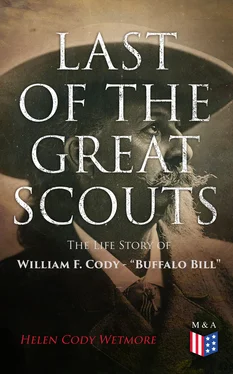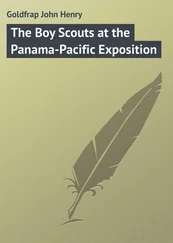There was a long breathing spell, which the trio improved by strengthening their defense, digging up the dirt with their knives and piling it upon the mules. It was tedious work, but preferable to inactivity and cramped quarters.
Two hours went by, and the plan of the enemy was disclosed. A light breeze arose, and the Indians fired the prairie. Luckily the grass near the trail was short, and though the heat was intense and the smoke stifling, the barricade held off the flame. Simpson had kept a close watch, and presently gave the order to fire. A volley went through the smoke and blaze, and the yell that followed proved that it was not wasted. This last ruse failing, the Indians settled down to their favorite game—waiting.
A thin line of them circled out of range; ponies were picketed and tents pitched; night fell, and the stars shot out.
As Woods was wounded, he was excused from guard duty, Will and Simpson keeping watch in turn. Will took the first vigil, and, tired though he was, experienced no difficulty in keeping awake, but he went soundly to sleep the moment he was relieved. He was wakened by a dream that Turk was barking to him, and vaguely alarmed, he sat up to find Simpson sleeping across his rifle.
The midnight hush was unbroken, and the darkness lay thick upon the plain, but shapes blacker than night hovered near, and Will laid his hand on Simpson's shoulder.
The latter was instantly alive, and Woods was wakened. A faint click went away on the night breeze, and a moment later three jets of flame carried warning to the up-creeping foe that the whites were both alive and on the alert.
There was no more sleep within the barricade. The dawn grew into day, and anxious eyes scanned the trail for reinforcements—coming surely, but on what heavy and slow-turning wheels!
Noon came and passed. The anxious eyes questioned one another. Had the rear train been overcome by a larger band of savages? But suddenly half a dozen of the Indians were seen to spring up with gestures of excitement, and spread the alarm around the circle.
"They hear the cracking of the bull-whips," said Simpson.
The Indians who had seen the first team pass, and had assumed that Simpson and his companions were straggling members of it, did not expect another train so soon. There was "mounting in hot haste," and the Indians rode away in one bunch for the distant foothills, just as the first ox-team broke into view.
And never was there fairer picture to more appreciative eyes than those same lumbering, clumsy animals, and never sweeter music than the harsh staccato of the bullwhips.
When hunger was appeased, and Woods's wound properly dressed, Will, for the second time, found himself a hero among the plainsmen. His nerve and coolness were dwelt upon by Simpson, and to the dream that waked him in season was ascribed the continued life on earth of the little company. Will, however, was disposed to allow Turk the full credit for the service.
The remainder of the trip was devoid of special incident, and as Will neared home he hurried on in advance of the train. His heart beat high as he thought of the dear faces awaiting him, unconscious that he was so near.
But the home toward which he was hastening with beating heart and winged heels was shadowed by a great grief. Sister Martha's married life, though brief, had amply justified her brother's estimate of the man into whose hands she had given her life. She was taken suddenly ill, and it was not until several months later that Will learned that the cause of her sickness was the knowledge that had come to her of the faithless nature of her husband. The revelation was made through the visit of one of Mr. C——'s creditors, who, angered at a refusal to liquidate a debt, accused Mr. C——of being a bigamist, and threatened to set the law upon him. The blow was fatal to one of Martha's pure and affectionate nature, already crushed by neglect and cruelty. All that night she was delirious, and her one thought was "Willie," and the danger he was in—not alone the physical danger, but the moral and spiritual peril that she feared lay in association with rough and reckless men. She moaned and tossed, and uttered incoherent cries; but as the morning broke the storm went down, and the anxious watchers fancied that she slept. Suddenly she sat up, the light of reason again shining in her eyes, and with a joyous cry, "Tell mother Willie's saved! Willie's saved!" she fell back on her pillow, and her spirit passed away. On her face was the peace that the world can neither give nor take away. The veil of the Unknown had been drawn aside for a space. She had "sent her soul through the Invisible," and it had found the light that lit the last weary steps through the Valley of the Shadow.
Mr. C—— had moved from Leavenworth to Johnson County, twenty-five miles away, and as there were neither telegraph nor mail facilities, he had the body sent home, himself accompanying it. Thus our first knowledge of Martha's sickness came when her lifeless clay was borne across our threshold, the threshold that, less than a year before, she had crossed a bright and bonny bride. Dazed by the shock, we longed for Will's return before we must lay his idolized sister forever in her narrow cell.
All of the family, Mr. C—— included, were gathered in the sitting-room, sad and silent, when Turk suddenly raised his head, listened a second, and bounded out of doors.
"Will is coming!" cried mother, and we all ran to the door. Turk was racing up the long hill, at the top of which was a moving speck that the dog knew to be his master. His keen ears had caught the familiar whistle half a mile away.
When Turk had manifested his joy at the meeting, he prepared Will for the bereavement that awaited him; he put his head down and emitted a long and repeated wail. Will's first thought was for mother, and he fairly ran down the hill. The girls met him some distance from the house, and sobbed out the sad news.
And when he had listened, the lad that had passed unflinching through two Indian fights, broke down, and sobbed with the rest of us.
"Did that rascal, C——, have anything to do with her death?" he asked, when the first passion of grief was over.
Julia, who knew no better at the time, replied that Mr. C——was the kindest of husbands, and was crushed with sorrow at his loss; but spite of the assurance, Will, when he reached the house, had neither look nor word for him. He just put his arms about mother's neck, and mingled his grief with her words of sympathy and love.
Martha was shortly after laid by father's side, and as we stood weeping in that awful moment when the last spadeful of earth completes the sepulture, Will, no longer master of himself, stepped up before Mr. C——:
"Murderer," he said, "one day you shall answer to me for the death of her who lies there!"
When Will next presented himself at Mr. Majors's office, he was told that his services had been wholly satisfactory, and that he could have work at any time he desired. This was gratifying, but a sweeter pleasure was to lay his winter's wages in mother's lap. Through his help, and her business ability, our pecuniary affairs were in good condition. We were comfortably situated, and as Salt Creek Valley now boasted of a schoolhouse, mother wished Will to enter school. He was so young when he came West that his school-days had been few; nor was the prospect of adding to their number alluring. After the excitement of life on the plains, going to school was dull work; but Will realized that there was a world beyond the prairie's horizon, and he entered school, determined to do honest work.
Our first teacher was of the good, old-fashioned sort. He taught because he had to live. He had no love for his work, and knew nothing of children. The one motto he lived up to was, "Spare the rod and spoil the child." As Will was a regular Tartar in the schoolroom, he, more than all the other scholars, made him put his smarting theory into practice. Almost every afternoon was attended with the dramatic attempt to switch Will. The schoolroom was separated into two grand divisions, "the boys on teacher's side," and those "on the Cody side." The teacher would send his pets out to get switches, and part of our division—we girls, of course—would begin to weep; while those who had spunk would spit on their hands, clench their fists, and "dare 'em to bring them switches in!" Those were hot times in old Salt Creek Valley!
Читать дальше












